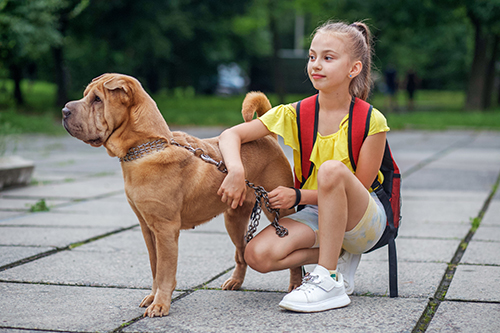Understanding and Supporting Your Furry Friends When Kids Go Back to School
As summer draws to a close and the school year begins, many households experience a significant shift in routine. This change doesn’t just affect the human members of the family—our pets feel it too. While kids head back to school, the sudden quiet and the absence of their playmates can leave pets feeling lonely, anxious, or even depressed. Understanding how pets feel during this time and taking steps to support them can help ensure a smooth transition for everyone.
The Emotional Impact on Pets
Pets, especially dogs and cats, thrive on routine and the companionship of their human family members. When children are home during the summer, pets often receive extra attention, playtime, and affection. The return to school means fewer interactions and potentially longer periods of being left alone, which can lead to several emotional responses:
- Loneliness and Separation Anxiety: Dogs, in particular, are social animals that can develop strong bonds with children. When the kids suddenly leave for school, dogs may experience separation anxiety, characterized by behaviors such as excessive barking, destructive chewing, or even bathroom accidents indoors.
- Depression and Lethargy: Some pets may become lethargic or show signs of depression when their playmates are no longer around. Cats, who often form close bonds with children, may withdraw, sleep more, or lose interest in activities they previously enjoyed.
- Boredom and Restlessness: Without the usual hustle and bustle of a full house, pets might become bored. This boredom can lead to undesirable behaviors such as scratching furniture, chewing shoes, or engaging in other mischievous activities to entertain themselves.
How to Support Your Pet During the Transition
Fortunately, there are several ways to help your pet adjust to the new routine and minimize any negative feelings they may experience:
- Maintain a Routine: Consistency is key. Try to keep your pet’s feeding, walking, and playtime schedule as regular as possible. This helps create a sense of stability and predictability, reducing anxiety.
- Interactive Toys and Puzzles: Invest in some interactive toys or treat puzzles to keep your pet engaged while the kids are away. These toys can provide mental stimulation and prevent boredom.
- Quality Time Before and After School: Encourage the kids to spend quality time with your pet before they leave for school and when they return. Even just 10-15 minutes of playtime or cuddling can make a big difference.
- Create a Cozy Space: Designate a comfortable and quiet area in your home where your pet can retreat when they need some alone time. A cozy bed, some favorite toys, and perhaps a piece of clothing with a familiar scent can help your pet feel secure.
- Consider a Pet Sitter or Dog Walker: If your pet is struggling with loneliness, consider hiring a pet sitter or dog walker to break up the day. This can provide some much-needed companionship and exercise.
- Gradual Adjustment: If possible, start adjusting your pet to the school routine a few weeks before classes begin. Gradually increase the time your pet spends alone so that the transition isn’t so abrupt.
- Positive Reinforcement: Reward your pet for calm and positive behavior during the school day. This can help reinforce that being alone isn’t a bad thing and that they are still loved and cared for.
- Send them to Dog training at Our House Braselton: Perhaps it is time for them to learn a few new tricks.
- Send them to Doggie Daycare at Our House Braselton: allow them to have fun and play with other dogs.
- They will also enjoy Our Housr Braselton Grooming service
Signs Your Pet Needs Extra Help
While most pets will adjust to the new routine over time, some may need extra support. If you notice persistent signs of anxiety, depression, or destructive behavior, it might be worth consulting with your veterinarian. They can offer additional strategies or recommend a professional pet behaviorist if needed.
The back-to-school season is a time of change for everyone, including our pets. By understanding how they feel and taking proactive steps to support them, we can help our furry friends navigate this transition with ease. After all, a happy pet makes for a happy home!
This article is designed to provide SEO-optimized content, targeting keywords such as “how pets feel when kids go back to school,” “pet anxiety,” “separation anxiety in pets,” and “pet care during school year.” By incorporating these keywords naturally throughout the article, it aims to attract pet owners looking for advice and guidance during this transitional period.


